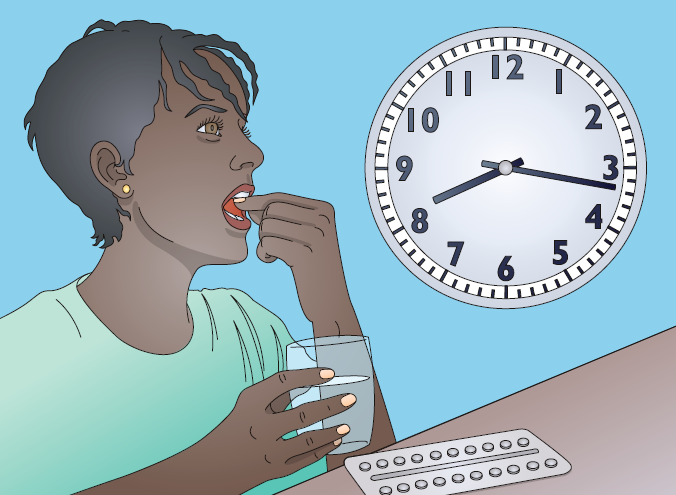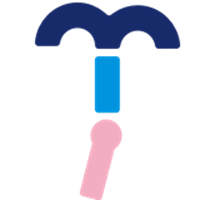Oral contraceptive pill
A daily pill to protect from unplanned pregnancies.

A short-acting contraceptive method
Contraceptive pills, when taken at the same time every day help prevent pregnancy.
Contraceptive pills contain hormones, similar to those naturally produced by a woman’s body. The pill needs to be taken at the same time every day to effectively prevent pregnancy. Its ability to prevent pregnancy depends on a person using it correctly.
The two types of pill we have available have different advantages and disadvantages, depending on the woman. During a consultation we can help you decide if one of these is right for you.
It can take between 5 to 7 days for the pill to start working. You can use a condom or abstinence during this time. Your normal fertility will return immediately after you stop taking the pill.

Types of contraceptive pill
We offer two types of contraceptive pill, the progestogen-only pill (mini pill) and the combined pill.
While both pills offer effective pregnancy prevention when used correctly, the two types are quite different in both their advantages and things to consider.
Combined pill
The combined oral pill is a tablet that contains two hormones, progestin and estrogen, and is taken daily to prevent pregnancy.
Mini pill
The mini pill (progestin-only pill) is a tablet that contains one hormone, progestin, and is taken daily to prevent pregnancy.
Unsure which method is right for you?
Take a look at our online contraception tool – Choice. The website uses a simple questionnaire to provide you with clear, tailored advice on your contraceptive options.
” Contraceptive pills are a quick, easy way to prevent unplanned pregnancies. They are extremely effective for women who are able to remember to take them at the same time each day. “
How contraceptive pills work
All types of contraceptive pill make it harder for sperm to penetrate a woman’s womb and reach an egg.
Depending on the type of pill, they may also have an effect on the release of an egg each month.
To be effective as a contraceptive method, you must make sure to take the pill regularly, following the instructions provided for each product.
If you’re ever in doubt, or think you may be pregnant while using the pill, please get in touch with us as soon as possible.

Frequently asked questions about contraceptive pills
– When taking your first pill, choose a convenient time to take it. This can be any time of the day.
– Once you’ve chosen a time you must then take one pill each day at this same time every day
– The progestogen-only pill has to be taken every day. Users of the combined pill have the option to take a 7 day break and have a monthly bleed, or to skip or shorten their monthly bleed
– It can make your periods regular, lighter, and less painful
– It gives you the choice not to have a monthly bleed or control when you have a bleed
– Your fertility will return to normal immediately after the you stop using the pill
– It is not used during sex so will not affect spontaneity
– It helps protect against some forms of cancer (uterus (womb), colorectal, and ovarian).
– It reduces the risk of getting fibroids, ovarian cysts and non-cancerous breast disease
– It may reduce acne and improve your skin.
What are the advantages of the progestin-only pill?
– It can be used when you are breast feeding.
– Your fertility will return to normal immediately after the you stop using the pill
– You can start it straight after childbirth, abortion or miscarriage
– It is not used during sex so will not affect spontaneity
– Your period may become lighter or stop altogether
Disadvantages of the combined pill:
– The pill has to be taken once per day. Forgetting to take the pill on a daily basis could make it fail. If you do not have a routine and think you will not be able to take a pill at the same time each day, it may not be the right method for you.
– Some people may not be suitable to have methods containing oestrogen. Please talk to your provider about whether it is safe for you to take
– You may get temporary side effects at first including headaches, nausea, breast tenderness and mood changes
– Irregular bleeding and spotting may occur in the first few months of use
– The pill may not work if you experience vomiting or diarrhoea.
– Use of some medications, such as those for seizures (fits), HIV or for tuberculosis, can make the pill less effective. Check with your medical provider if your medications are compatible with use of the pill.
– Condoms are the only contraceptive method which protect against sexually transmitted infections. To ensure protection from both pregnancy and infection, we recommend “dual protection”. This means using a male or female condom in addition to the contraceptive method of your choice to prevent pregnancy.
Disadvantages of the progestin-only pill:
– The pill has to be taken once per day at the same time. Forgetting to take the pill on a daily basis could make it fail. If you do not have a routine and think you will not be able to take the pill at the same time each day, it may not be the right method for you.
– Some users develop more frequent or irregular bleeding while taking the mini pill.
– Some users may experience headaches, breast tenderness and acne, but these symptoms generally get better within the first few months of using the pill.
– The pill may not work if you have vomiting and diarrhoea.<br>Use of some medications, such as those for seizures (fits), HIV or for tuberculosis, can make the pill less effective. Check with your medical provider if your medications are compatible with use of the pill.
– Condoms are the only contraceptive method which protect against sexually transmitted infections. To ensure protection from both pregnancy and infection, we recommend “dual protection”. This means using a male or female condom in addition to the contraceptive method of your choice to prevent pregnancy.
The pill works well at preventing pregnancy. However, its ability to stop a pregnancy largely depends on a person using it properly. With typical use up to 7 out of 100 users will become pregnant.
If you think you will not be able to take a pill at the same time each day, it may not be the right method for you.
The pill is associated with some rare risks. For most people the benefits outweigh the possible risks. Your provider will ask you questions to check whether you could be at higher risk (e.g. if you smoke, have high blood pressure, or are overweight etc.).
There are some rare risks associated with the contraceptive pill:
– Development of a blood clot in your leg or lungs
– Heart attack
– Stroke
Ready to book?
If you’re ready to visit us, book an appointment to reduce your waiting time at the clinic.
Find a clinic that offers oral contraceptive pills and related services.
Find your best fit
If you’re unsure what method is best for you, take our online contraception quiz.

Other contraceptive methods
We offer a range of contraceptive and sexual health services to suit you.













